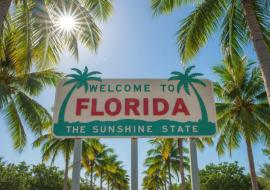Visit Florida Takes a Shot at International Tourism

(News 4 JAX) - Florida’s tourism-marketing agency has started to dip its toes into Canada and England while continuing to focus initial marketing efforts on Floridians and East Coast travelers as the economically vital industry tries to rebound amid the COVID-19 pandemic, the agency’s chief executive said this week.
Visit Florida President and CEO Dana Young said the public-private agency has started a campaign with The Weather Network, a Canadian English-language weather channel, and co-hosted a five-day virtual “TTG Florida Fest” this month with the travel industry newspaper TTG Media, in trying to position the state for when travel by foreign tourists resumes.
The TTG Florida Fest event, which attracted about 400 travel agents and tour operators in the United Kingdom, included panel discussions and classes about different aspects of Florida, such as potential wilderness adventures. The event also featured a yoga session and a craft-beer tasting hosted by a Tampa brewmaster, according to TTG Media.
Young said Florida is “one of the very few destinations in the world that are doing anything in the international sphere. And certainly, one of the only states that’s marketing right now outside of its own borders.”
The agency is trying to reinstall confidence in travelers after the pandemic cut tourism in the state by 60.5 percent during the second quarter of this year. Third quarter numbers have not been released.
At the start of October, Visit Florida expanded a roughly $13 million marketing effort toward East Coast regions considered short drives or flights to Florida. The marketing effort began a month earlier with a campaign to get Floridians to explore the state after being locked down because of the pandemic.
However, international marketing and travel will take longer as Europe is experiencing a surge in cases of the virus.
With a few exceptions, the U.S. government has restrictions on travelers who during the previous 14 days have been in China, Iran, the United Kingdom, Ireland, Brazil and European countries in what is known as the Schengen Area, such as Germany, France and Italy, according to the Centers for Disease Control and Prevention.
And since March 21, the U.S.-Canada border has been closed to non-essential travel in an effort to slow the spread of the virus.
Canada allows entry to its citizens, people with dual Canadian citizenship, permanent residents of Canada and foreign nationals entering from the United States engaged in essential work. However, those travelers must answer a health questionnaire and have a 14-day quarantine plan upon arrival.
On Oct. 19, Canada’s Minister of Public Safety and Emergency Preparedness, Bill Blair, and U.S. Department of Homeland Security Acting Secretary Chad Wolf announced the extension of the border crossing restrictions until at least Nov. 21.














